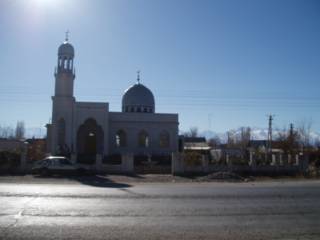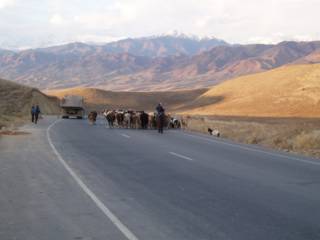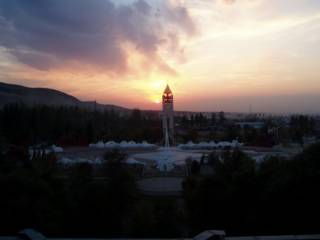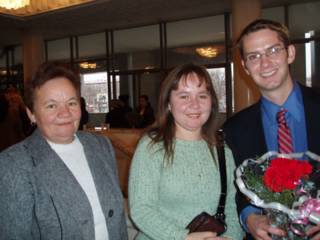After you live any place new for awhile, things you once found extraordinary become everyday and commonplace. While there is sadness in this loss of easy fascination, there is also opportunity to explore subtler layers of the new world. Sometimes this exploration requires effort (mindful reflection during the process of comparing realities) Other times, you simply fall right on to them.
For instance, I have discovered how easy it is for foreigners to trip on the stairs. At first, I thought it was because we were fascinated with everything else and didn’t pay attention while navigating the stairwells. Or, because we were always carrying bags, boxes and suitcases and couldn’t see properly. Or, Maybe it was because the stairs were always poorly lit. Lot’s of theories bounced around in my head—and I shared them with other volunteers, whose scrapes and bruises spoke of their own desire to answer this riddle. And then I heard the stories about the former Soviet Union…
I can only tell you what I have heard…and so, in some ways, this is only a rumor—but it is a rumor that has spawned my theory. As you may or may not know, the former Soviet Union was renown for its uniformity. Not only do statues and buildings ring with the dull monotonous tone of blocky, geometric similitude—but entire cities were erected using exactly the same plans. Everything from the library to the bread store to the names of the streets, all carbon copies of other cities in other regions in other oblasts. Call it uniformity, assimilation, structural equality—but it’s less than artistic and the antithesis of originality and self-expression.
Apparently an entire genre of literature and film has risen from the blueprints of this Soviet architecture. The stories I have heard go something like this: a man passes out on a train which is bound for the city of a loved one (let’s say it’s his girlfriend). He is planning on proposing to this woman upon his arrival. Unknowingly, he misses his stop, and alights in another city. The city, a replica of his girlfriend’s, has the same buildings, street names etc. In essence, he gets off the train in another universe—one only slightly different from his own. He walks to the building where his girlfriend lives and another woman opens the doors or it could be a boyfriend or husband who greets him. You can imagine what happens…humor, chaos, confusion, insight, new discoveries. The point is, despite a world intentionally structured to create bland familiarity and blasé sameness—expressions of individuality and uniqueness surface.
Now imagine the poor architects and craftsman who spent their entire lives building the same thing over and over again. How Sisyphean! How frustrating must that have been to be forever destined to build the same city, library, courthouse, over and over and over again. An artist’s nightmare…to have the creativity wrenched out of you--your very being and desire to Create, squeezed from your pores and dripped into the same dry cement that seals your fate every time you erect another coffin shaped apartment building.
And then you have an idea.
The big bellies in Moscow seem only to be concerned with appearances. A sort of
If it looks the same then it is the same—where’s the vodka? mentality. And so you decide to test them.
You start by making the stairs smaller—so that the courthouse in Leningrad has fifty fives steps while the seemingly identical one in Stalingrad has sixty. Nobody notices your subtle disturbance and you feel exhilarated.
You share this with the other architects and artisans and builders and before you know it every staircase in every building becomes an explosive medium for self-expression. Stairs are no longer uniform, in fact every single one is different. A different size, a different length a different height—sometimes each step is even forged from a different batch of cement; each difference restoring the soul of the artist; filling his empty lungs with oxygen; his heart with warm blood. Originality, individualism, self-expression.
Those who were born of this culture of architectural rebellion have no problem navigating what foreigners find foolish, Masonic treachery. Those native to this land learn early that every stair is sacred, a masterpiece that deserves, in fact, demands, attention. They navigate with an innate knowledge that a nation can not rely on uniformity to secure its path in history—that self-expression requires responsibility.
As for me, I’m still licking my wounds and watching my bruises change colors. But as I do, I hope to keep noticing those subtle things like stairs.









